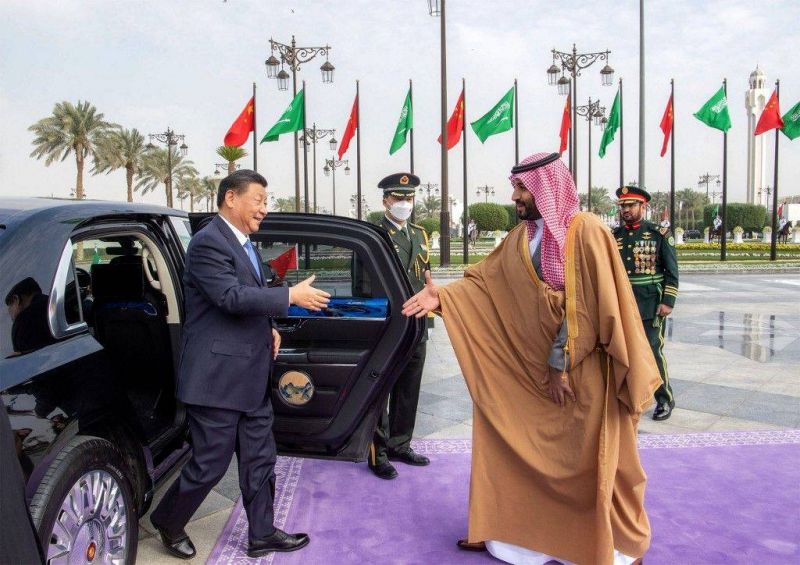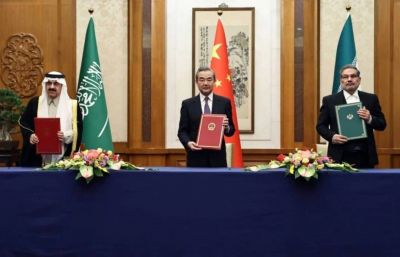
Saudi Crown Prince Mohammed bin Salman greets Chinese President Xi Jinping in the capital Riyadh on Dec. 8, 2022. (Credit: Bandar Al-Jaloud/Saudi Royal Palace/AFP)
Just a few years ago, it would have been practically unimaginable for Saudi Arabia, America’s longtime strategic partner, to join an economic and security organization led by China and Russia. Last month, however, the kingdom approved a memorandum of understanding granting it the status of “dialogue partner” in the Shanghai Cooperation Organization (SCO) — the first step toward full membership.
The SCO’s foundations were laid in the 1980s, when the Soviet Union and China were attempting to navigate tensions over their shared border. After the Soviet Union’s dissolution, two parties became five: the People’s Republic of China, the Russian Federation, Kazakhstan, Kyrgyzstan and Tajikistan. In 2001, the so-called Shanghai Five agreed that they should move beyond demarcation and demilitarization of borders to deepen regional cooperation, and the SCO was born.
Today, the SCO includes the Shanghai Five, plus India, Pakistan and Uzbekistan, with Iran expected to join this year. The SCO also has nine dialogue partners — Armenia, Azerbaijan, Cambodia, Egypt, Nepal, Qatar, Sri Lanka, Turkey and now Saudi Arabia — with five more countries having embarked on the same path. Three countries — Afghanistan, Belarus and Mongolia — have observer status.
While the SCO is not a military alliance comparable to, say, NATO, nor is it a mere economic association. On the contrary, the SCO charter establishes security cooperation as central to the organization’s purpose, and SCO members regularly hold joint military and anti-terrorism exercises. For example, joint “counterterrorism exercises” are planned for August in Russia’s Chelyabinsk oblast.
Saudi Arabia’s move to join the SCO represents a victory for China, which has been seeking to boost its geopolitical influence and challenge the current United States-led international order. The diplomatic component of this effort has been crucial. For example, less than three weeks before Saudi Arabia approved the SCO memorandum, it agreed to a China-brokered deal to restore diplomatic relations with Iran. No one should be surprised if China soon sets its sights on mediating a solution to the Palestinian-Israeli conflict.
But it is China’s economic clout that makes such diplomatic achievements possible. It is no coincidence that on March 27 — two days before the Saudis signed the SCO memorandum — the state-owned oil giant Saudi Aramco announced that it had acquired a 10 percent stake in China’s Rongsheng Petrochemical Co., Ltd., in a deal valued at $3.6 billion. Saudi Aramco — which was already supplying more than four times as much crude to China as to the US — has now agreed to supply refineries in China with 690,000 barrels of crude oil per day.
Saudi Arabia appears to be selling its loyalty to the highest bidder. In addition to the SCO, the kingdom has formally asked to join another China-dominated grouping, the BRICS, which also includes Brazil, Russia, India and South Africa. Conceived in 2001 by Goldman Sachs as an asset class, the BRICS grouping soon took on a life of its own. In 2006, it emerged as a trade alliance, and it has been attempting to position itself as a geopolitical alternative to the G7, even discussing the launch of a single currency that could act as an alternative to the US dollar.
Given that China accounts for 72 percent of the BRICS’ total GDP, the bloc — possibly in an expanded form — could well decide to start settling trade payments in renminbi. Even if that does not happen yet, China may decide to settle its hydrocarbon purchases from Saudi Arabia in renminbi, as it has been doing with Russia. Given that China accounts for 15 percent of global oil demand, and 10 percent of the global oil trade, other nearby oil-producing countries may be drawn into the same arrangement.
To be sure, China is not likely to drive the US out of the Middle East any time soon, not least because America remains a top security partner for most of the Gulf states. Saudi Arabia continues to host US military bases, and last month the two countries completed their first joint counter-drone exercise at a new military testing center in Riyadh. In the same week, two Saudi Arabian airlines announced plans to order 78 planes from US manufacturer Boeing and take options to buy 43 more.
Nonetheless, China’s growing footprint in the Middle East has the US worried. While US officials have played down the implications of Saudi Arabia’s move to join the SCO, saying that it was long overdue, they have expressed concern about the adoption of Huawei 5G technology in the Middle East and urged the United Arab Emirates to shut down what they view as a Chinese security facility. Cooperating with China, the US warns, could undermine countries’ relationships with America.
In Saudi Arabia’s view, it is the US that has been damaging bilateral relations. During the 2020 election campaign, US President Joe Biden threatened to make the kingdom a “pariah” for the killing of journalist Jamal Khashoggi. Though Biden has since softened his position, a few fundamental restrictions — for example, on the supply of weapons — remain in place.
Moreover, US Senators Chris Murphy and Mike Lee recently introduced a “privileged resolution” to require the State Department to investigate Saudi Arabia’s domestic human-rights practices and its involvement in the war in Yemen. According to the resolution, all security assistance to the kingdom will be cut off unless the report is submitted within 30 days.
Saudi Arabia’s turn toward China thus reflects its dissatisfaction with US policy. And while this is hardly the first time the Saudis have employed this approach to political bargaining, familiar does not mean harmless. Enabling China’s efforts to corral Middle Eastern countries into political and economic blocs could have far-reaching strategic consequences.
Djoomart Otorbaev, a former prime minister of Kyrgyzstan, is the author of "Central Asia’s Economic Rebirth in the Shadow of the New Great Game" (Routledge, 2023).
Copyright: Project Syndicate, 2023.

